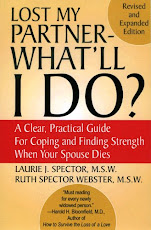
In our
last post, we covered what it felt like once the visits and activities following your late spouse/partner’s funeral begin to taper off.
But how do you cope with feelings (such as those of abandonment), that may arise as things quiet down?
Keep in mind that others usually take their cues from you about how much or how little interaction you want or need. Although you may find it a struggle just to get out of bed each day, please consider the following:
1. It’s okay to reach out to others. They will probably be pleasantly surprised to receive a phone call or e-mail from you.
2. Keep it simple. Suggest an activity like coffee, a meal or a movie that involves a minimal time commitment from you during this difficult period.
3. Look into widowed groups as a place to meet others who are going through similar experiences (discover many other opportunities for meeting people in our book, Lost My Partner – What’ll I Do?)
4. Spend some time with children and/or grandchildren. Visits can be kept short if that’s more convenient for you.
5. Although your memory and concentration are probably impaired right now, others will understand. Remind yourself that these symptoms of grief will get better.
Remember to take one step at a time and try not to remain isolated from other people.

